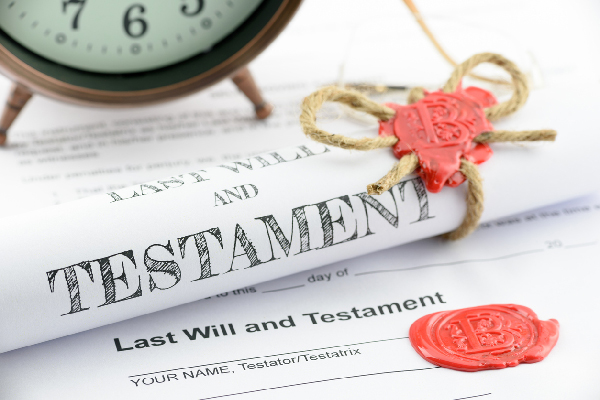
If you have recently begun the estate planning process and are considering incorporating a will, you may find yourself worrying that your will could be contested. While it is rare for a will to be challenged in court, it is possible. A successful will contest could mean that all of your estate planning was for naught. As you begin the process of drafting your will, it is then critical that you take precautions to protect it. This will help to ensure that your final wishes are upheld once you are gone.
Yet, you may find yourself asking a lot of questions, particularly if you are not familiar with the process of contesting a will. For instance, you may wonder who can contest a will, why a will can be contested, and what you can do to protect your will. Keep reading to learn answers to these and other FAQs we receive about contested wills.
What Does it Mean to Contest a Will?
As you likely already know, a will is a legal document outlining a deceased person's wishes for how they want their estate to be handled and their property to be divided. However, hurt feelings, complex emotions, and even greed can cause one of your loved ones to contest your will.
Contesting a will is a long, complicated, and expensive process in which the person challenging the will tries to prove that the will is invalid. However, just because a beneficiary is disgruntled about their inheritance does not necessarily mean that they can successfully contest a will. In order to contest a will, a person must be legally entitled to do so. They must have a legal basis for their claim.
Who Can Contest a Will?
Fortunately, not just anyone can contest a will. Just because a person believes that they should be included in a loved one's will does not necessarily mean that they can challenge. In order to have legal standing to contest a will, they must fall under one of the following categories:
- The party is a beneficiary already named in the will.
- They are a beneficiary named in a previous will who was either written out of the current will or whose share of the estate was significantly decreased by the newest will.
- The interested party was not named in the will, but because of the state's intestacy laws, they would be eligible to inherit property if a will didn't exist (such as a spouse, child, or other next-of-kin).
If one of these parties believes that the will should not be considered valid, then they can notify the court of their wish to contest the will. However, it is important to note that will contests are rarely successful, as the person contesting the will must have a valid legal basis for doing so. A person cannot contest a will just because they feel it is unfair.
When Can a Will Be Contested?
In order for a will to be contested, the person contesting the will must have valid legal concerns about the validity of the will. Generally, a will can only be contested if the contesting party believes that one of the following took place:
The Will Was Improperly Executed
One of the most common reasons for a will to be contested is due to execution problems. In order for a will to be considered valid, it needs to be signed and dated in the presence of at least two adult witnesses who also signed the will. In most states, witnesses cannot be people named as beneficiaries in the will. If there are problems with how a will was executed, a beneficiary may use this as an excuse to contest the will.
Fraud or Undue Influence Took Place
There may also be grounds to contest a will if there is evidence that the testator was a victim of fraud. For instance, fraud may have taken place if a relative handed the testator a document to sign claiming it was a real estate contract when it was in fact a will. If there is evidence that the testator did not intend to create a will, the will may be invalidated. Manipulating a testator in an attempt to get them to alter their will can invalidate a will.
The Testator Was Not Mentally Competent
Another common reason for wills to be challenged is if the testator's mental capacity is in question. In order for a will to be valid, the testator must be mentally competent when writing the will. If the testator is of sound mind, then they are considered to have testamentary capacity. However, if there are concerns about the testator's testamentary capacity, a beneficiary may try to challenge a will on the grounds that the testator had diminished mental capacity when they created the will and did not know what they were doing.
What Happens if a Challenge Is Successful?

So, what happens if a will contest is successful? Ultimately, this will depend on a variety of factors. If the court agrees that the will is invalid, it is likely that it will be thrown out. If an earlier will exists, that will may be used in its place instead. Alternatively, if no earlier will exists, the estate's assets could be distributed by the court in accordance with the state's intestacy laws. Of course, even if a challenge to a will is successful, other beneficiaries could appeal, which could ultimately lead to a costly, drawn-out legal battle.
Can I Prevent a Challenge to My Will?
Considering that your will allows you to decide how your assets are distributed, take certain precautions. Fortunately, it is possible to reduce the risk of your will being contested. One of the best things that you can do to protect your will is to be careful drafting it. Make sure that all ambiguities are removed and that all legal formalities are followed. You can also discourage challenges to your will by adding a no-contest clause.
While a no-contest clause doesn't mean that no one can challenge your will, it disincentivizes challenges. No contest clauses then reduce the likelihood that one of your beneficiaries contesting your will.
One thing you can do to protect your will is to work with an estate planning attorney. An experienced attorney knows how to draft an estate plan that is less vulnerable to challenges. They can help you to decide which estate planning options will best protect your family.
Conclusion
Feel free to contact us to learn more about the benefits of working with an attorney when creating your estate plan.
For more information please request a copy of our Legal Services Schedule (PDF format).
![]()